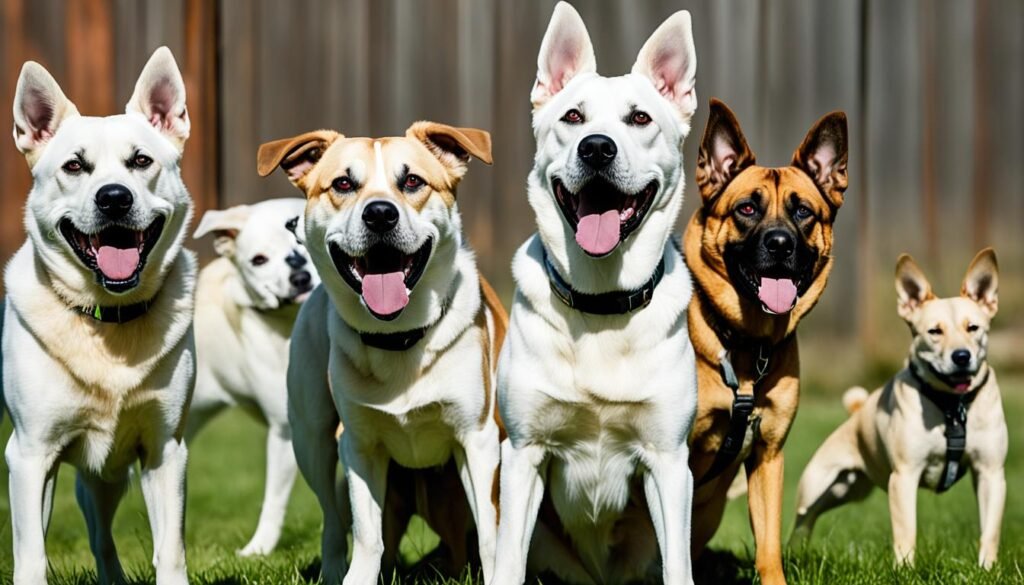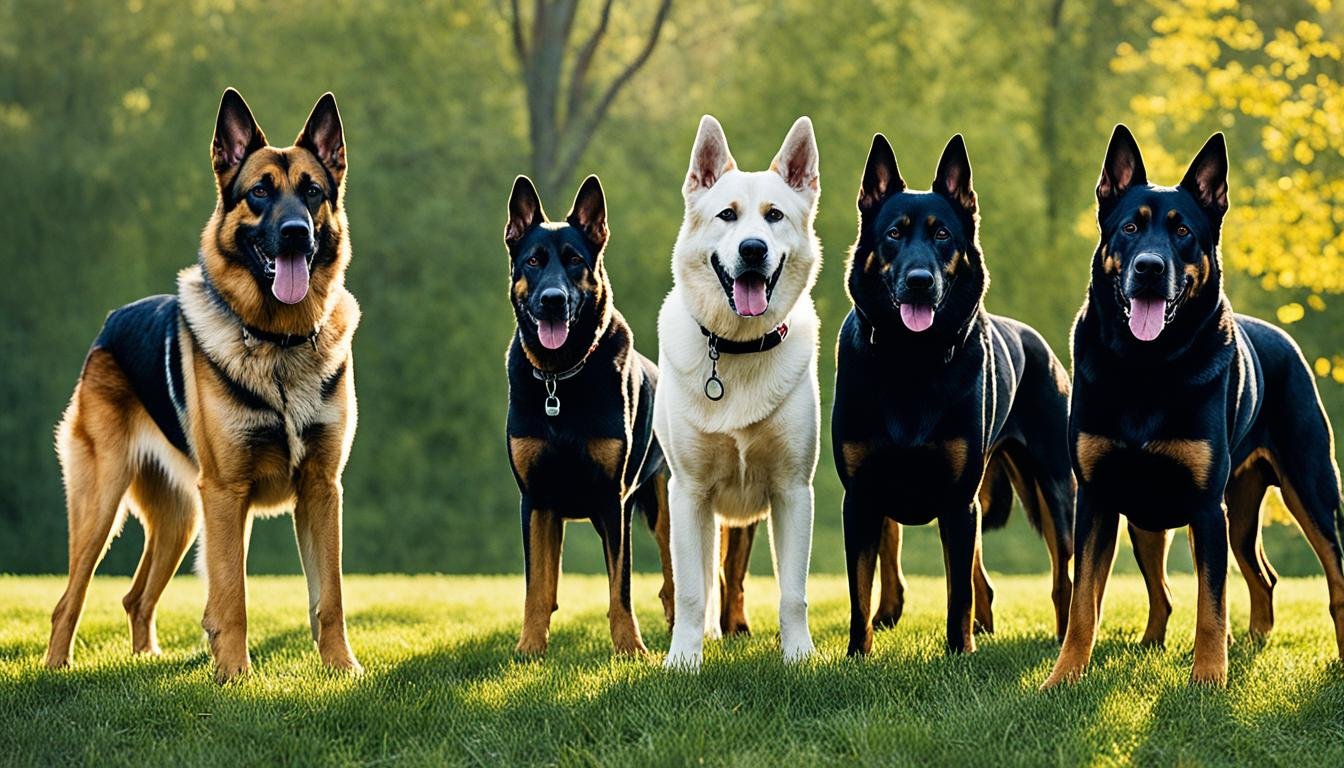Did you know that a staggering 94% of dog owners consider their canine companions to be territorial by nature1? While this behavior is often seen as a positive trait, providing protection and a sense of security, it can also lead to aggressive and potentially dangerous behavior if not properly managed. In this comprehensive guide, we’ll delve into the factors that influence canine territoriality and explore the specific breeds that are often considered the most territorial, equipping you with the knowledge to foster a harmonious relationship with your four-legged friend.
Defining Territorial Aggression in Dogs
Territorial aggression in dogs is a natural instinct that is deeply rooted in their evolutionary history. Dogs, like many other animals, have an innate drive to defend their personal space, resources, and family members from perceived threats. This behavior is often more pronounced in certain breeds that were historically bred for guarding, hunting, or fighting activities1. Understanding the underlying causes of territorial aggression is crucial for owners to effectively manage and mitigate this behavior.
Biological Factors Contributing to Territoriality
Genetics play a significant role in a dog’s propensity for territorial aggression2. Breeds that were selectively bred for traits like strength, size, and high prey drive are more likely to exhibit territorial behaviors1. Additionally, hormonal imbalances, such as excess testosterone, can contribute to heightened aggression in some dogs2.
Environmental Factors Shaping Territorial Behavior
While genetics provide a foundation for territorial behavior, environmental factors also play a crucial role in shaping a dog’s personality and aggression levels. Dogs that experience abuse, neglect, or lack of proper socialization during their critical developmental stages are more likely to exhibit territorial aggression2. Exposure to violence or a lack of positive interactions with people and other animals can also contribute to this behavior2.
What dog is most territorial?
When it comes to the most territorial dog breeds, a few stand out due to their unique characteristics and breeding history. Breeds like the Chihuahua, Rottweiler, Pitbull Terrier, Neapolitan Mastiff, Presa Canario, Chow Chow, Dogo Argentino, German Shepherd, and Basenji are often considered among the most aggressive and territorial1. These breeds may have a higher predisposition to guarding and protective behaviors, which can lead to territorial aggression if not properly socialized and trained2.
Key Takeaways
- Territorial aggression in dogs is a natural instinct rooted in their evolutionary history.
- Genetics, hormones, and breeding history can contribute to a dog’s propensity for territorial behavior.
- Environmental factors, such as socialization and exposure to violence, also play a significant role in shaping a dog’s territorial aggression.
- Certain breeds, like the Chihuahua, Rottweiler, and Pitbull Terrier, are often considered the most territorial due to their unique characteristics and breeding history.
- Responsible ownership and proper training are essential to manage territorial aggression in dogs and ensure the safety of both the dog and its human companions.
Defining Territorial Aggression in Dogs
Canine aggression is a complex behavior that can have various underlying causes, including biological factors and environmental influences. Territorial aggression, in particular, refers to a dog’s defensive or protective behavior towards individuals or animals that approach their perceived territory3. This type of aggression is primarily fear-based, as dogs aim to defend their space and resources from potential threats3.
Biological Factors Contributing to Territoriality
Genetics and hormonal imbalances can play a significant role in a dog’s propensity for territorial aggression3. Certain breeds that have been bred for guarding and watchful behaviors may be more prone to intense territorial displays without proper socialization and training4. Additionally, neurological conditions or imbalances in neurotransmitters like serotonin can contribute to heightened fear and anxiety, further exacerbating territorial behaviors3.
Environmental Factors Shaping Territorial Behavior
Inadequate socialization, lack of proper training, and exposure to abuse or neglect can also shape a dog’s territorial behavior4. Dogs that are physically prevented from gaining access to perceived threats may develop heightened aggression or displacement behaviors, as they become increasingly frustrated4. On the other hand, early socialization, good control, and teaching dogs to respond positively to new arrivals can help mitigate territorial tendencies4.
Understanding the biological and environmental factors that contribute to territorial aggression is crucial for developing effective strategies to prevent and manage this behavior in dogs34. By addressing the root causes and implementing comprehensive training and management techniques, pet owners can help their canine companions feel secure and reduce the risk of harmful incidents.
Proper socialization and training are key to managing territorial behaviors in dogs.
“Territorial aggression in dogs is a complex issue that requires a multifaceted approach, addressing both biological and environmental factors to achieve the best outcomes for pet owners and their canine companions.”34
What dog is most territorial?

While certain dog breeds, such as Pit Bull Terriers, Rottweilers, and German Shepherds, have a reputation for being more territorial, it’s important to recognize that aggression is not solely determined by breed5. Male dogs tend to exhibit stronger territorial characteristics, while females dogs also display territorial behavior to an extent5. Factors like breeding for specific traits, lack of socialization, and improper training can all contribute to a dog’s territorial behavior5.
It’s essential to approach each dog as an individual and address any aggressive tendencies through responsible ownership, positive reinforcement training, and early socialization. Breed-specific traits can be misleading, as dogs of the same breed can have vastly different temperaments and behavioral tendencies5. For instance, Doberman Pinschers are noted for their highly territorial nature5, while other breeds such as Rottweilers, Bull Mastiffs, Rhodesian Ridgebacks, German Shepherds, and Giant Schnauzers are also known for their territorial behaviors5.
Misconceptions about breed aggression can lead to unfair prejudices and discrimination against certain dogs. By understanding the complex factors that influence a dog’s territoriality, you can make informed decisions about selecting and training your canine companion, ensuring a safe and harmonious living environment for both you and your pet5.
| Breed | Average Weight | Average Height | Life Expectancy |
|---|---|---|---|
| Chihuahua | 2 to 7 pounds | 6 to 9 inches | 12 to 14 years |
| Dachshund | 15 to 30 pounds | 15 to 19 inches | 12 to 16 years |
| Chow Chow | 40 to 90 pounds | 17 to 22 inches | 11 to 13 years |
| Akita | 60 to 100 pounds | 23 to 28 inches | 8 to 10 years |
| American Pitbull Terrier | 35 to 60 pounds | 18 to 21 inches | 8 to 14 years |
| Cane Corso | 100 to 110 pounds | 24 to 28 inches | 10 to 12 years |
| Doberman Pinscher | 60 to 100 pounds | 24 to 28 inches | 10 to 12 years |
| German Shepherd | 66 to 88 pounds | 24 to 28 inches | 9 to 13 years |
| Rottweiler | 110 to 130 pounds | 24 to 27 inches | 8 to 10 years |
| Siberian Husky | 45 to 60 pounds | 21 to 24 inches | 12 to 14 years |
According to the data, the average cost of a claim for treating behavioral problems in dogs is around $2756.
“Approach each dog as an individual and address any aggressive tendencies through responsible ownership, positive reinforcement training, and early socialization.”
Conclusion
In conclusion, managing canine aggression, including territorial behavior, requires a comprehensive approach that addresses both biological and environmental factors. While certain breeds may be more prone to territorial tendencies, research indicates that breed alone does not determine a dog’s behavior7. Instead, a combination of factors, including genetics, socialization, training, and environmental influences, contribute to a dog’s overall temperament and aggression levels7.
Responsible dog ownership, which includes providing proper training, socialization, and positive reinforcement, is essential for mitigating aggressive tendencies7. Additionally, seeking the guidance of veterinarians and animal behaviorists can help dog owners develop tailored strategies for managing canine aggression and fostering a safe, harmonious relationship between dogs and their human companions8.
By understanding the nuances of territorial aggression, embracing a balanced approach to dog training and management, and recognizing the individual nature of each canine, dog owners can create an environment where both the dog and the family can thrive. This holistic approach, grounded in responsible dog ownership and the support of professionals, is key to addressing the complex issue of canine aggression and ensuring the well-being of all involved78.
FAQ
What factors influence a dog’s territorial behavior?
A dog’s territorial behavior can be influenced by both biological and environmental factors. Biological factors like genetics and hormonal imbalances can contribute to a dog’s propensity for aggression, while environmental factors such as lack of socialization, inadequate training, and exposure to abuse or neglect can also shape territorial behavior.
Which dog breeds are known to be the most territorial?
Certain dog breeds, such as Pit Bull Terriers, Rottweilers, and German Shepherds, have a reputation for being more territorial. However, it’s important to recognize that aggression is not solely determined by breed. Factors like breeding for specific traits, lack of socialization, and improper training can all contribute to a dog’s territorial behavior.
How can dog owners manage territorial aggression in their pets?
Responsible ownership, including proper training, socialization, and seeking professional help when needed, is essential for managing aggressive tendencies in dogs. Positive reinforcement training and early socialization can help prevent and address territorial behavior, while addressing underlying biological or environmental factors can also be important.







